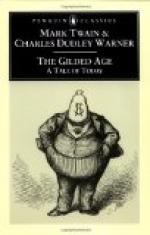The week seemed very short that he passed in Hawkeye, and when he bade Laura good by, he seemed to have known her a year.
“We shall see you again, Mr. Sterling,” she said as she gave him her hand, with just a shade of sadness in her handsome eyes.
And when he turned away she followed him with a look that might have disturbed his serenity, if he had not at the moment had a little square letter in his breast pocket, dated at Philadelphia, and signed “Ruth.”
CHAPTER XX.
The visit of Senator Abner Dilworthy was an event in Hawkeye. When a Senator, whose place is in Washington moving among the Great and guiding the destinies of the nation, condescends to mingle among the people and accept the hospitalities of such a place as Hawkeye, the honor is not considered a light one. All, parties are flattered by it and politics are forgotten in the presence of one so distinguished among his fellows.
Senator Dilworthy, who was from a neighboring state, had been a Unionist in the darkest days of his country, and had thriven by it, but was that any reason why Col. Sellers, who had been a confederate and had not thriven by it, should give him the cold shoulder?
The Senator was the guest of his old friend Gen. Boswell, but it almost appeared that he was indebted to Col. Sellers for the unreserved hospitalities of the town. It was the large hearted Colonel who, in a manner, gave him the freedom of the city.
“You are known here, sir,” said the Colonel, “and Hawkeye is proud of you. You will find every door open, and a welcome at every hearthstone. I should insist upon your going to my house, if you were not claimed by your older friend Gen. Boswell. But you will mingle with our people, and you will see here developments that will surprise you.”
The Colonel was so profuse in his hospitality that he must have made the impression upon himself that he had entertained the Senator at his own mansion during his stay; at any rate, he afterwards always spoke of him as his guest, and not seldom referred to the Senator’s relish of certain viands on his table. He did, in fact, press him to dine upon the morning of the day the Senator was going away.
Senator Dilworthy was large and portly, though not tall—a pleasant spoken man, a popular man with the people.
He took a lively interest in the town and all the surrounding country, and made many inquiries as to the progress of agriculture, of education, and of religion, and especially as to the condition of the emancipated race.
“Providence,” he said, “has placed them in our hands, and although you and I, General, might have chosen a different destiny for them, under the Constitution, yet Providence knows best.”
“You can’t do much with ’em,” interrupted Col. Sellers. “They are a speculating race, sir, disinclined to work for white folks without security, planning how to live by only working for themselves. Idle, sir, there’s my garden just a ruin of weeds. Nothing practical in ’em.”




